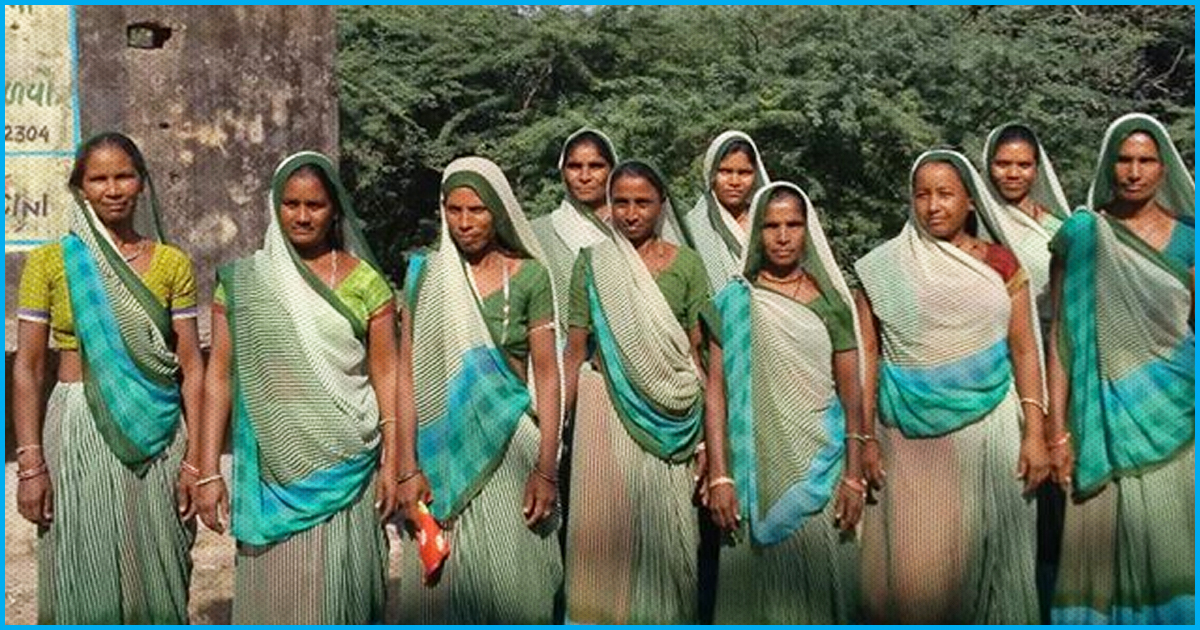
Tribal Farmers In Gujarat Soon To Be 'Lakhpatis', Thanks To This Project Driven By Village Women
8 Nov 2018 4:26 PM GMT
Editor : Ankit Sharma Sharma
Green tea Addict | A Tree Hugger | Born for Change
At the invitation of Points For People and Tata Trusts, The Logical Indian visited Khedbrahma block in Sabarkantha district Gujarat, to document the progress of Tata Trusts’ ‘Lakhpati Kisan’ initiative. The area is primarily inhabited by the descendants of the fearless Bhil tribes, who, even a few years ago, battled extreme poverty. Surviving on small-scale farming in little plots, and rearing malnourished goats, cows and sheep – these tribal villagers had little hope or vision to improve their living conditions. At present, residing amidst fertile fields overflowing with crops, they have discovered a new dimension of life. The transformation of these nondescript villages into models of agro-development has been made possible by the village women, who have been trained and moulded into future leaders by experts at Tata Trusts.
Before sharing snippets from the lives of the humans of Khedbrahma, it is important here to give a context about this extraordinary initiative.

‘Lakhpati Kisan’ aims to transform 1 lakh households
In 2007, Tata Trusts established Collectives for Integrated Livelihood Initiatives (CInI) to focus on the upliftment of the overlooked tribal belts of central India, covering the states of Gujarat, Rajasthan, Maharashtra, Madhya Pradesh, West Bengal, Jharkhand, Chattisgarh and Odisha.
In Gujarat, their latest programme – Mission 2020: Lakhpati Kisan – encapsulates the aim to improve agriculture, resource management, education, sanitation and livelihood in poverty-stricken rural zones, by targetting to increase the annual income of around 1,00,000 households from a meagre Rs 35,000 to Rs 1.2 lakh. In collaboration with Points For People, a unique crowdsourcing platform that redeems your loyalty points to Tata Trusts, the Lakhpati Kisan initiative has been propelled to a substantial scale.

Particularly, the agriculture and livelihood sectors have seen significant development in the 23 villages of Khedbrahma along the Gujarat-Rajasthan border, outlined by the Aravalli hills. “Started in 2015, we have been able to achieve an income level of around Rs 72,000 per family so far,” informs Mahesh Patel, deputy director of the programme.
Watering the dry lands green
Sauntering through the lush green fields of cotton and golden patches of ripe maize and pulses, CInI team leader Sujit Kumar narrated how these terrains were once infested by drought, soil erosion and crop failure. Intimated by experts from CInI and VIKSAT, the villagers themselves have built check dams, bunds and gabion structures from local materials to conserve water in these rain-fed areas. Ditching the age-old practice of flood irrigation, they have now switched to drip irrigation, solar-powered lift irrigation and fertigation, increasing their produce manifold.

While learned men with pens peeping from their shirt pockets explained the science and math of a solar-powered pump, standing in one corner, cotton farmer Bhoja Bhai never stopped grinning for one second. Every ounce of his pride to see ‘city folks’ being awed by the 35 metres deep well he and his friends dug, was evident in that smile.

“Three years ago, my husband and I would struggle to save even 100 rupees at the end of a month. This was before these solar pumps. Look at our fields now. After harvesting this cotton, I will grow wheat, bajra, vegetables and whatnot,” shared an exuberant Munni Ben, farmer and an active member of ‘Anjali’, one of the 476 Self-Help Groups in the area.
“With my savings, I am sending my kids to good school now. We have renovated our house and even started a mobile repair shop in the town,” she adds with a shy smile for the camera.

A plate full of flavours
Traditionally, these black soil lands failed to support the growth of food crops other than maize and a limited variety of pulses. Vegetables, fruits used to be a far cry. However, with the proper harnessing of available resources, now the same lands are flourishing with a wide variety of greens. Though the predominant staple food continues to be ‘makai ki rotela’ (thick bread made from corn flour), vegetables like tomato, potato, bitter gourd and eggplant have made their way into the rural palate.
Pest and diseases rampantly used to affect the saplings before; a problem which has now been overcome by seed treatment and polyhouse nurseries.
“I used to help my parents in farming, there was so much work,” shares a 7-year-old girl in a school uniform, “After they opened this nursery, my father told he won’t need my help anymore, so I go to school now.”

The most interesting fact about these small-scale cotton farmers and sharecroppers is that they farm the cotton primarily for seed production, which is highly profit-yielding. Seed production specialists from CInI train these farmers, most of whom were unskilled before. Corporate seed suppliers like Monsanto, Mahyco obtain seeds from these farmers at a sizable price as per international standards.
Who runs the world? Girls
Perhaps the greatest achievement of the initiative is the extensive integration of womenfolk, who were previously confined to the kitchen, kids and chores. “Now women comprise 60% of the agricultural labour force. We are astonished to see their unbreakable stamina,” declares Mahesh Patel. In fact, the Self-Help Groups happen to be the backbone of the whole project.
At Changod village, a group of women in colour-coordinated sarees seem to be occupied in some serious discussion, seated in the trailing afternoon shade. “This is one of the Self-Help Groups. Some of these women walk 5-6 kilometres to attend these meetings on time every week,” introduces one of the board members. “Every SHG has devised a dress code for themselves, as you can see here,” he smiles.

Rekha Ben, the elected team leader, starts speaking with an incredibly confident attitude. Introducing her team, she eloquently talks at length about how their group has initiated a savings bank for the villagers on revolving capital basis. These villages, with an appalling literacy rate of 37% as per the 2011 census, now have the basic financial literacy to manage their expenses and plan for a better future. “She has even talked to Collector Sahib,” another lady tells, finding everyone awestruck at Rekha Ben’s rhetoric.
Black marketing was a menace plaguing their lives, prior to the introduction of biometric-controlled FPCs (Farmer Production Companies). “The wholesalers used to cheat us; offering poor rates for our produce, or distorting their weights. Now we know calculations, and the rates have also been fixed. They will secure your identity with thumbprints. By God’s grace, we get paid our hard work’s worth. You won’t find a single illegal trader in the market now,” Balli Ben informs. Incidentally, she is one of the trained ‘internet saathis’ in Changod, who know how to operate a smartphone, surf the net, watch YouTube tutorials and recipe videos and use WhatsApp.

“I want to learn sewing and handicrafts,” young Asha Ben chimes in. “We have become very busy now, Madam. We believe we can do anything. Even our husbands listen to us now.” she glows with a newfound ambition.
The Logical Indian take
Change is always welcome. But, a change that has percolated the very veins of an entire community, and brought a wave of revolution in their lives, is certainly worth kudos. The Logical Indian team salutes the brilliant initiative by Tata Trusts in collaboration with Points For People. Brian Almeida, the co-founder of Points For People, says, “This initiative was created with a vision of helping communities in our country to be self-sufficient and self-sustainable. The concept of redeeming one’s loyalty points and donating it towards worthy causes creates a spirit of generosity among the people and manifest to a truly global society.”
Also Read: How To Make Use Of A Forest Killing Weed? Engaging Tribals, This Professor Is Making Eco-Furniture
With #MySocialResponsibility, we aim to bring you more inspiring stories of individuals and organisations across the globe. If you also know about any changemakers, share their story at [email protected] and we'll spread the word.
 All section
All section













